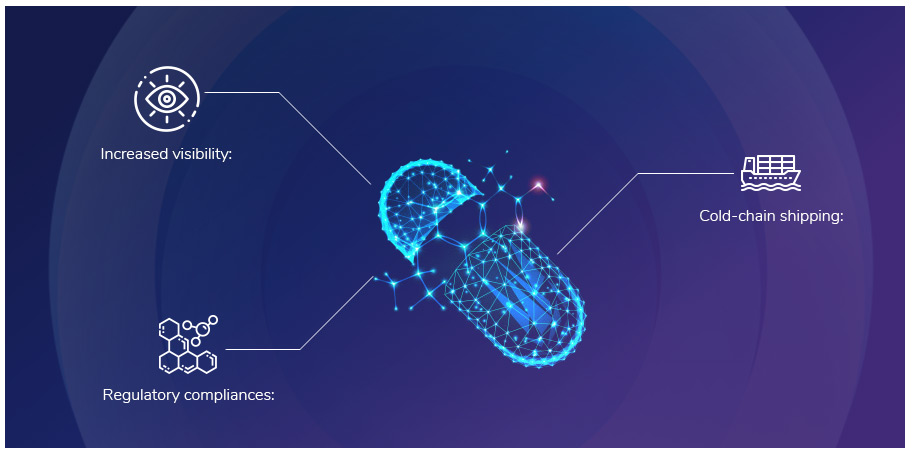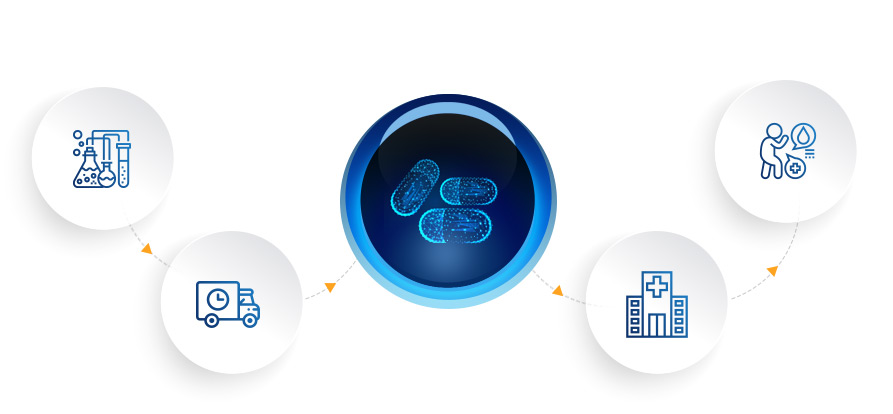Blockchain in Pharma Supply Chain
8 min readNov 12th, 2019
Effective supply chain management is one of the biggest challenges in every industry, and this is especially true for healthcare, where there is an added risk and complexity in maintaining and storing the records. After all, a compromised supply chain in Healthcare can affect the patient’s safety.
As technological adoption increases, so does globalization and growth of industries populated with multiple stakeholders. This has given rise to a complicated supply chain. The pharmaceutical supply chain is one of the most significant verticals when we’re talking about the damaged areas of healthcare supply chain.
According to a Fraser Insititute Study, the worldwide pharmaceutical sales reached 1.1 trillion USD in the year 2016. The OECD has found the counterfeit goods account for approximately 2.5 percent of the global pharmaceutical drugs trade. Experts have also estimated the sales of counterfeit drugs to be twice the rate of legal pharmaceutical trade, which is a really serious issue.
The pharma Blockchain holds the potential of enhancing security, integrity, data provenance, and functionality of supply chain, because at its very core, the blockchain technology is transparent, immutable, and auditable in nature. Keeping this at fore, many Blockchain-focused companies are working towards remodeling tracking and accountability in the shipping of goods.
Blockchain in Pharma Supply Chain offers a lot more benefits than just reducing counterfeiting and theft issues. It even goes further to help manage inventory.
Through this article, let’s explore how exactly can Blockchain be implemented in the pharma supply chain and what benefits it can bring to the entire healthcare ecosystem. The topics we’ll be discussing in this article include:
 A typical drug distribution model comprises of three trading partners - manufacturers, wholesalers, and pharmacists. To understand the role of Blockchain in supply chain, let’s consider the case of a pharmaceutical supply chain and how pharma blockchain can help improve it:
A typical drug distribution model comprises of three trading partners - manufacturers, wholesalers, and pharmacists. To understand the role of Blockchain in supply chain, let’s consider the case of a pharmaceutical supply chain and how pharma blockchain can help improve it:
 Typical stakeholders that can be involved in the entire supply change during the distribution of drugs are as follows:
As is evident, a private blockchain can truly be a compelling use case of pharma supply chain. But, the rights granted to each stakeholder can be different depending on their roles in the chain of supply.
The initiatives that can be created using Blockchain in Pharma industry are vast - much more than nearly any other industry, even. It can be predicted that blockchain will have a significant impact on Pharma, especially the supply chain aspect of it, in a not-so-far future. After all, Blockchain has the solution to all the legacy problems haunting the pharma industry, thanks to its immutable, transparent, and centralized nature. Whatever be the case, Blockchain is sure looking to present immense opportunities to make every part of the life cycle better -- for sponsors, service producers, supply chain and, most importantly, patients.
Typical stakeholders that can be involved in the entire supply change during the distribution of drugs are as follows:
As is evident, a private blockchain can truly be a compelling use case of pharma supply chain. But, the rights granted to each stakeholder can be different depending on their roles in the chain of supply.
The initiatives that can be created using Blockchain in Pharma industry are vast - much more than nearly any other industry, even. It can be predicted that blockchain will have a significant impact on Pharma, especially the supply chain aspect of it, in a not-so-far future. After all, Blockchain has the solution to all the legacy problems haunting the pharma industry, thanks to its immutable, transparent, and centralized nature. Whatever be the case, Blockchain is sure looking to present immense opportunities to make every part of the life cycle better -- for sponsors, service producers, supply chain and, most importantly, patients.
Pharmaceutical Supply Chain require an innovative solution. Here's why:

- Increased visibility: A lack of visibility is one of the most significant challenges that raises further issues like drug shortages, counterfeits, and opioids. Patients, retailers, and even regulators are generally unsure about the origin of the drug and its manufacturing process. Also, if there was some contamination found in the drug during the time of manufacturing, the supplier can be called up to address the issue, because of lack of transparency.
- Regulatory compliances: Around 40% of manufactured drug products and 80% of active pharmaceutical ingredients are imported to the US from overseas. From production to distribution of the drug, every step needs to comply with the regulations under the Drug Supply Chain laws. Enforcing such strict regulations involves lengthy paperwork and takes a lot of time, sometimes ranging up to months even. Therefore, meeting the standards for traceability is something that is in dire need of changes.
- Cold-chain shipping: Most of the world’s top-selling medicines require cold-chain shipping, that is, storing the products in a temperature-controlled environment. Keeping the medicines cold is an essential part of the supply chain which connects the producers to the patients. However, storing the essential information related to cold-chain shipping in decentralized databases is prone to manipulations, and therefore data hacks. Further, the current software used for monitoring lacks tracking capability for a full chain of identity.
Blockchain in Pharma Supply Chain: Re-modeling the drug distribution process
 Typical stakeholders that can be involved in the entire supply change during the distribution of drugs are as follows:
Typical stakeholders that can be involved in the entire supply change during the distribution of drugs are as follows:
- Manufacturers
- Logistic Service Providers
- Distributors
- Hospital/Pharmacy
- Patient
Step 1: Manufacturer produces the drugs, and adds a QR code to it
A manufacturer manufactures the medicine and adds the QR code to it, which contains essential information like timestamp, item name, location, manufacturing date, and expiry date. The information added by the manufacturer then gets stored on the Blockchain, making it possible for all other stakeholders in the chain to trace the drugs’ supply chain transparently. Once the information is added to the Blockchain, a hash ID is produced that can be used for easily tracking back the transactions. The drugs can be shipped to the distributors via IoT-enabled vehicles with temperature-sensors that allow cold-chain shipping. It can also be possible to exchange and store the data gathered by these sensors on the Blockchain. The transparency and immutability offered by a distributed ledger can save a considerable amount of time in case of an audit of temperature-sensitive drugs and their storage conditions. The drugs that are transferred through IoT-enabled vehicles can also send real-time location to the blockchain so that every stakeholder present can find the precise time at which the drugs were delivered and received.Step 2: Distributors deliver the drugs to hospitals or pharmacists
Once the drug has reached the distributors, they can easily verify the origin of these medicines using the hash ID stored on the blockchain. Distributors can trace back the information added by manufacturers and check if it passes the quality checks or not. On validating the received medicines and digitally signing the transaction, the distributors can add it to the blockchain. The signed transactions will trigger the smart contracts to send drugs to the hospitals or pharmacists.Step 3: Pharmacists receive the drugs and perform necessary checks
When Pharmacists receive the drugs, they are in a position to trace it back to its origin using the hash ID saved on the blockchain. If any illegal distributor tries to sell counterfeit drugs, the transaction will be considered invalid because of the fraudulent information that will be present on the blockchain about the drug. Also, unauthorized individuals will not be able to carry out transactions in the supply chain ecosystem without a valid private key. Therefore, pharmacists would get to know in real-time if any anomalies are found within the transactions. Once the pharmacists/hospitals approve the received drugs, the transaction between the distributor and them is added to the blockchain, ensuring the legality of the deal between them.Step 4: Patients buy the drugs and use the QR code to trace back its source
Because of having a Blockchain implementation in the supply chain, patients can be sure about the medicines they are buying. By simply scanning the QR code attached to the drug’s packaging, they can get to know everything about its source and whether or not it meets the quality standards. Further, patients can also leave rating or feedback for the drug they bought, which would again be linked to the drug’s ID stored in blockchain, which will help future customers in their purchase. The drug supply chain’s transaction data which is being maintained by blockchain is consensus-driven, immutable, and transparent. Using a blockchain-based solution, it becomes possible to move the governance model of the drug supply chain from regulation to surveillance net (as every stakeholder can survey each action in the supply chain).The benefits that blockchain can offer in the pharma supply chain:
- End-to-end traceability of health products: Using pharma blockchain based solution will enable streamlined visibility of movement and stakeholders through which medicines transit in the entire supply chain. This improved traceability will eventually facilitate optimization of flows of goods and therefore an efficient stock management system.
- Reduced losses related to counterfeiting: A blockchain-based implementation can enable clear visualization of a particular drug’s journey from manufacturing to reaching the patients with digitized transactions. Therefore, it will be possible to examine vulnerable points throughout the supply chain, and reduce the chances of frauds associated with it.
- Transparency to enhance accountability: As mentioned earlier, using blockchain, the receiving and shipping of health products can be traced throughout the supply chain. Further, it is also possible to trace the stakeholders involved during the chain of shipment. If any problem arises during the supply of drugs, blockchain can identify the last stakeholder through which the product passed, thereby making it easier to find the source of error.
- Efficient recall management: Using blockchain in Pharma Supply Chain can allow the identification of exact locations of the medicines. The batch reminders can be sent efficiently and quickly while maintaining the increased safety of patient’s health.

